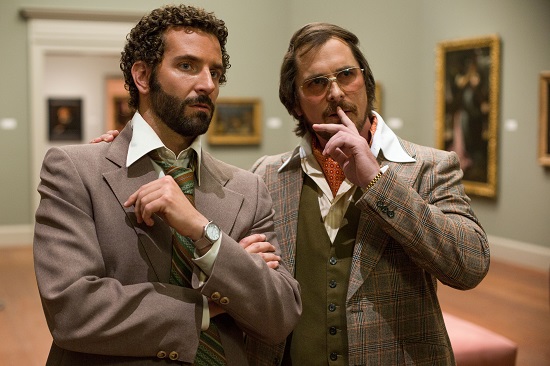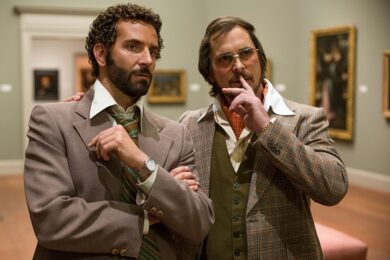No one has taken American Hustle’s life-affirming moral more seriously than its own director, David O. Russell. His new film possesses something truly rare in today’s film climate: an unfashionable, open-hearted positivism. Cynicism is rife in current cinema, as both Hollywood and the arthouse decry a world perilously close to going to pot. Yet American Hustle has the sizable cojones to offer something quite different. Where lesser, lazier directors would paint its cast of hucksters, shysters and airheads in unforgiving terms, Russell offers only love and empathy. In his new fictional world, also comprising The Fighter and Silver Linings Playbook, we delight as warm sincerity, against all odds, becomes a funky new definition of hipness.
However, that’s not to exalt American Hustle to an echelon it doesn’t deserve. It’s an entertainment; it wants to bring you giddy joy, not make you think too hard. The themes, and the evidence of deep thought underlying its making, are palpable, but not overbearing. Russell has come resiliently far from his enfant terrible indie stage, so perhaps the enduring statement chin-strokers will come later; currently though, he’s reveling as a richly talented ‘screwball’ prince of Hollywood prestige.
The film’s setting is derived from the Abscam scandal, a predictably zany detour in the US’s post-Watergate soul-searching. Abscam was a sting operation conducted by the FBI in the late 70s to unveil political corruption; eventually, six congressmen, one senator and numerous lower-rung politicos were ensnared by a ‘fake sheikh’ (actually a disguised federal agent) who proffered vast sums of cash for bribes. The scheme was devised, in a delicious turn of irony, by a convicted con-man himself; this was one Mel Weinberg, impersonated loosely in the film by Christian Bale – here he’s Irving Rosenfeld. Russell’s heavily fictionalised, farcical version of the story whips up this now-forgotten footnote of chicanery into something like The Thick Of It as directed by Scorsese.
Russell adores his ensemble cast, and endeavours here to make us love them equally. He’s plucked a famous five of charismatic character actors from his past films, along with poor old Jeremy Renner (once again an outlier and an outsider, but like his turns in The Avengers and Mission: Impossible, making himself at home in garrulous, intimidating company). Bale as the aforementioned Irv, is joined by Sydney (Amy Adams), his lover, muse and con-artist companion in arms. She’s cleverer, cannier and wilier than her paunchy paramour, adopting an aristocratic British burr to buffet his dodgy loan shark scams with a touch of old-empire cod-legitimacy. The dashing, yet highly eccentric FBI agent Richie DiMaso (Bradley Cooper – truly unleashed in eye-popping Method actor zeal), sniffs out their lower-level scams, and tasks them to helm his baby Abscam, the scheme designed to cement his reputation as a true mover amongst his Fed colleagues. Carmine Polito (Renner), the naive mayor of the impoverished Camden, New Jersey, is their main target; he’s desperate for any kind of cash, dirty as it may be, to revitalise his ailing constituency. Jennifer Lawrence, in uproarious form as Irv’s neglected spouse, is the sour cherry on top of this gourmet comic cocktail.
Returning again to Scorsese – that other indelible documenter of American hustling – brings the innovations of Russell’s cheerier spin on his style into flattering relief. Scorsese has always struck me, to bring out a tired old binary, as more of a Stones man than a Beatles man. Russell, comparatively, is made of squarer, cuddlier stuff. Flick through the record collection suggested by the film and there’s Steely Dan, ELO, the Bee Gees, Elton John and Tom Jones (harumph). Paul McC’s cheesiest song ever, ‘Live and Let Die’, rears its old moth-eaten, stadium rockin’ head – Axl Rose and Roger Moore be damned. A child of the ‘70s, Russell reflected on the music-taste battle lines in a recent video interview: “the kids, they hated that song – it wasn’t cool”. American Hustle has so much confidence, so much brazen self-belief, that this egregious 70s kitsch metamorphoses into anthemic mood-music. He locates the yearning and soulfulness in Magic FM staples like ‘Goodbye Yellow Brick Road’ and ‘I Feel Love’, so that we hear them anew. The film is really one giant confidence trick: a seductive, arresting smile from Adams, and especially Bale, chuckling as he peers out from under his perversely fashionable purple shades.
The con game is an especially cruel one in the annals of petty criminality; it’s awkwardly petrifying, to be wooed so decisively that we barely feel that cold knife sliding into our back. Perhaps this film’s merriment and light charm is just another crafty scam. The film’s deceptively subversive political stance offers the first clue; Russell is extremely interested in the implications of the skulduggery haunting the corridors of power. The FBI, populated by loony stand-up comics like Louis C.K, are pompous buffoons, whilst Abscam is a pernicious farrago of entrapment – just as self-deceiving and morally bankrupt as the ‘sleaze’ it pretends to indict. The film sits pretty in a long line of dissenting popular entertainments with a bleak, barely perceptible anti-American baseline; Russell is certain that to be truly ‘American’ is to hustle, lie, and cheat, to reinvent yourself and make anew your fantasies and desires. This is why, ultimately, Irv and Sydney are really wiser than their government captors; they know America the Beautiful itself may be the biggest con of them all.
To return to Russell, he’s certainly more damning of America than Americans. What finally radiates is his passion for people – characters, as he’s described, that he’d like to hang out with himself . Dreamers and strivers with big hearts; family men like Renner’s mayor character, proud and determined to put himself on the line for who and what he represents. This director’s humanist piety has cloyed in the past, but here it is gloriously refreshing and convincing.
American Hustle is in cinemas now



